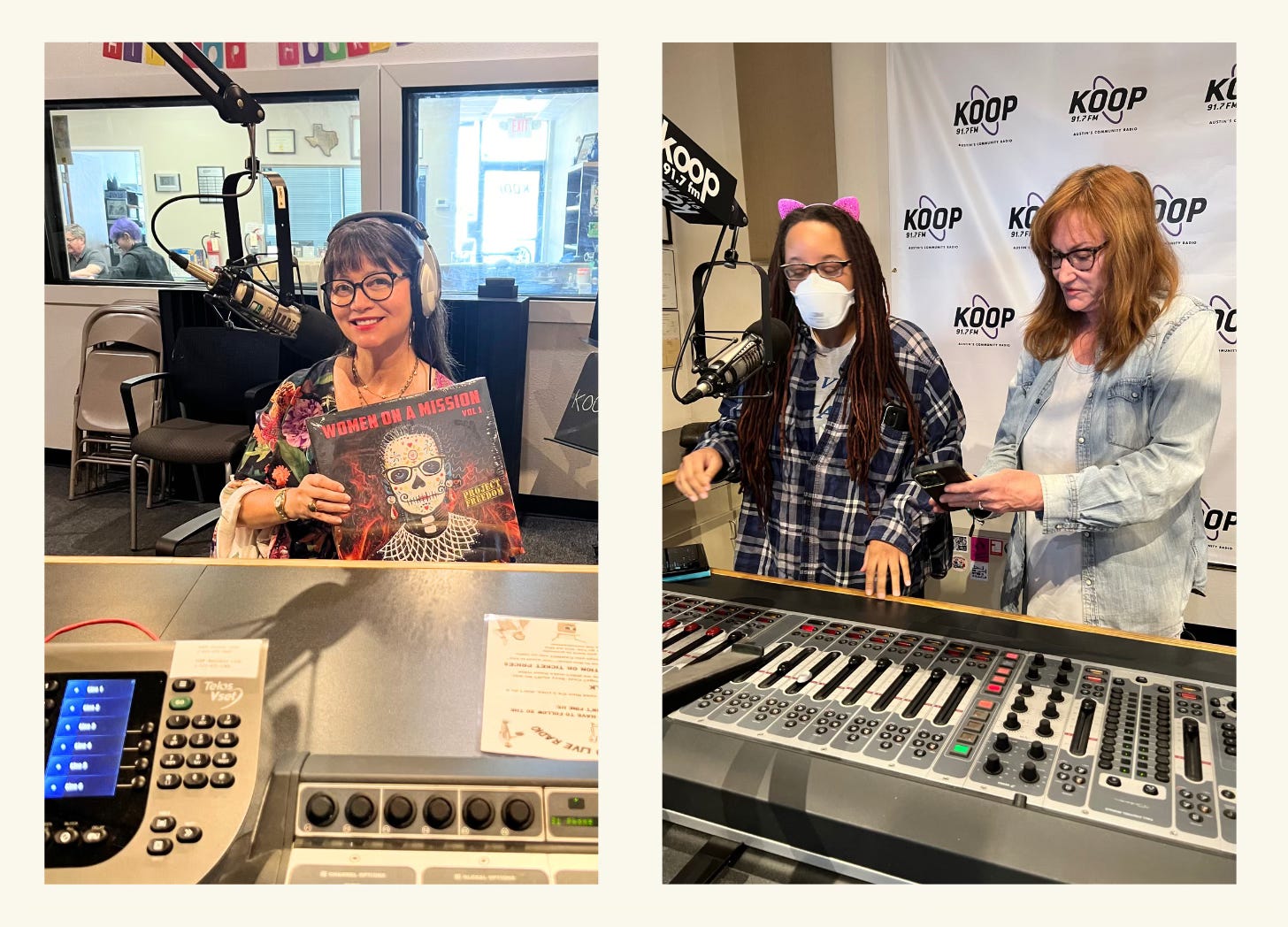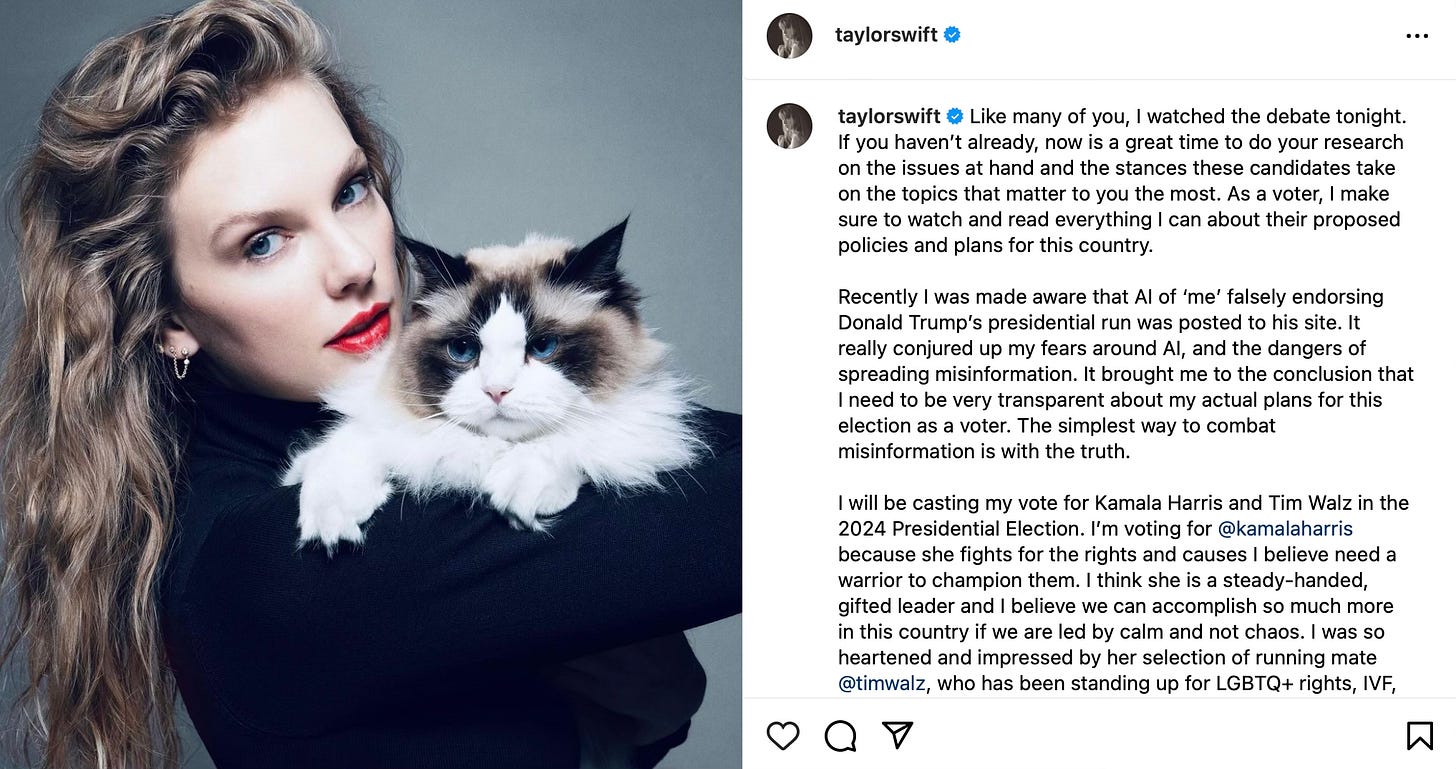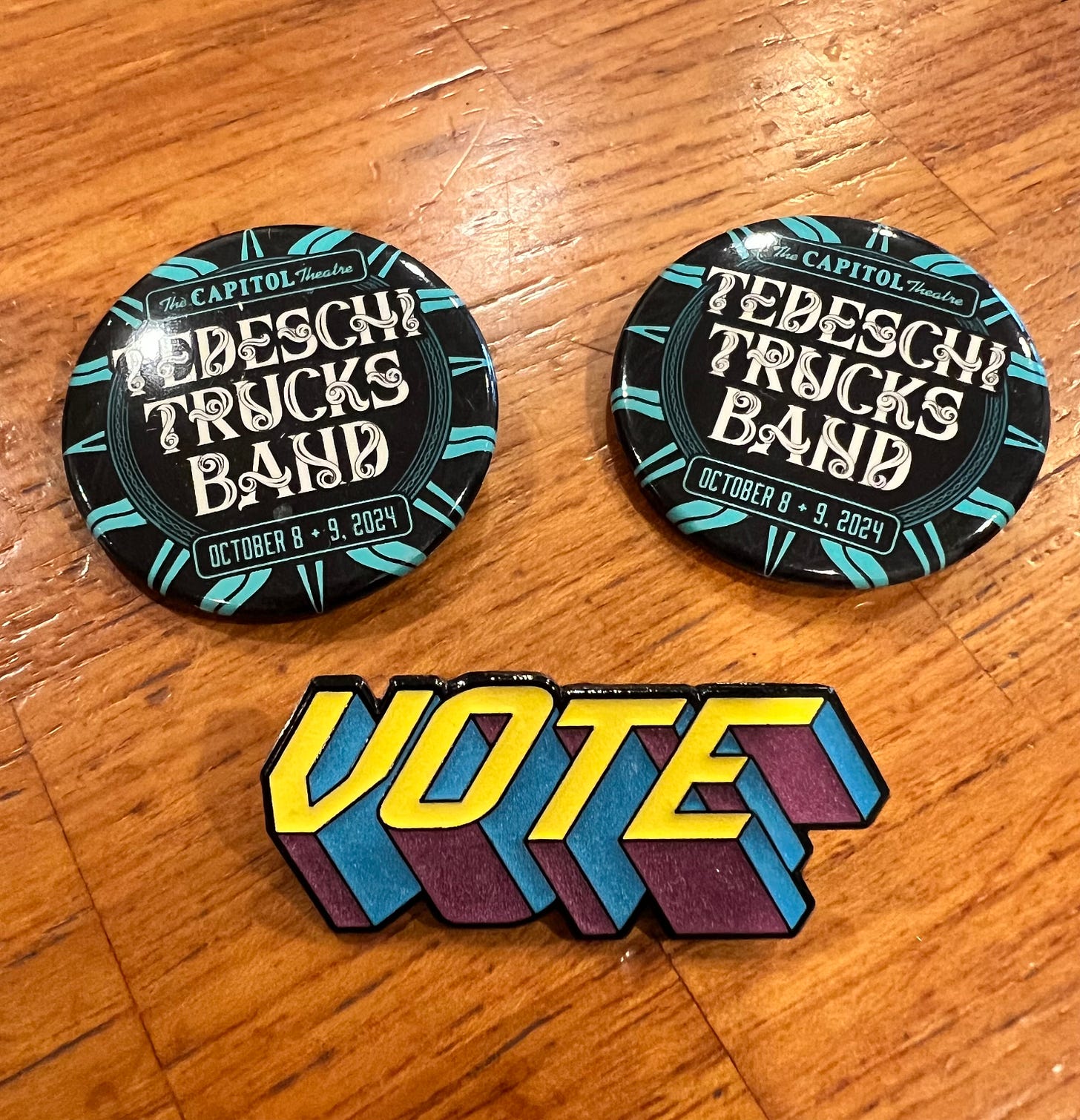Women Rockin' The Vote in 2024
Party Rockin': When Music and Politics Mix
In This Issue
Women Rockin’ The Vote
Music Videos: Party Rockin’ The Vote
Set Books Free Initiative
ICYMI
Women Rockin’ The Vote in 2024
There are only 15 days left until the 2024 Presidential Election (and many other state and local elections). I debated for a month about writing this article because Herizon Music used to be a nonprofit. We stayed away from anything that could be perceived as political support for a candidate or party because we were not classified as a political organization with the IRS or the State of Texas.
THAT TIME IS OVER.
No longer a nonprofit entity, we’re diving head first into politics by way of how women in music are supporting, or not supporting, certain candidates and issues. Please note that I am not telling you, my dear reader, how to vote. Although it would surprise me that people who truly support music makers (of both genders) would vote for candidates who want to ban music or books, tell artists to shut up and sing, or take away women’s rights to body autonomy and equal pay for equal work.
The Urban Dictionary defines “party rockin’” as showing up to a party out of control, loud, and unruly. LMFAO’s song "Sorry For Party Rocking" is cited as the term’s originator.
Applied to the political realm, it’s the phenomenon of music and musicians influencing their fans’ votes by saying which party or candidate or issue they are personally voting for. Even going to the extent of writing songs about hot issues or their candidates, and appearing at rallies to speak or perform. Texchromosome Radio DJ Penny Jo Pullus chatted with me about this on KOOP 91.7FM Radio in Austin, Texas on Thursday.
We touch on what needs to be “fixed’ in the licensing system so artists do not have to ask politicians to cease and desist after their songs are played at rallies or in ads. Penny Jo plays some protest and party rockin’ songs in between chats.

During our radio interview, KOOP volunteer Alana King chimed in with the example of Fleetwood Mac’s “Don’t Stop” as probably the most memorable party rockin’ tune in modern history. President Bill Clinton wanted to reach Gen X during his 1992 presidential campaign against George Bush, and he did so through music. “Don’t Stop” became his campaign trail theme song. Sporting sunglasses, he opened the Arsenio Hall Show playing saxophone with the house band for the show’s theme song and segueing into Elvis Presley’s “Heartbreak Hotel” to a standing ovation. No other presidential candidate had done that before, and most talking heads agree that it not only worked in attracting young voters for a win, it changed political strategy in the U.S.
Clinton’s example wasn’t the first time music was used to sway voters, it was just the most effective thanks to the bourgeoning 24-hour news cycle and non-traditional programming like MTV. NPR published a brief history of party rockin’ back to President George Washington who used a parody song (replacing original words with campaign words) called "FOLLOW WASHINGTON (GEORGE WASHINGTON)". The Library of Congress published "Songs of Politics and Political Campaigns” through the 1920s.
I spoke with Substack writer Sintija Brence, who is studying American Protest Music and Sociomusicology at York St. John University. Sintija explains when the role of music became an official campaign strategy in American politics.
“Politics and entertainment have always worked together in one way or another, since the early centuries and all decades,” said Sintija. “Of course, the dynamic and social status of the musician has changed dramatically. I would say the one socially equivalent to a political coordinator. However, George McGovern with his 1972 presidential election campaign helped to institutionalize the formal and expected role of celebrity coordinators in campaigns. In the 1970s, Jimmy Carter was endorsed by influential musicians like Larry Norman, Bob Dylan or Willie Nelson. Now we can still see musicians endorsing politicians. But the use of rock and roll in presidential elections was really set and transformed by former President Bill Clinton and New Democrats.”
It must be powerful because the DNC released a featured “roll call” song for each state of the union this year. See what your state’s song is courtesy of NPR.
Gender Politics
In all of these historical accounts, male acts dominate the political mix. However, we’re seeing more female artists party rockin’ as of late. Perhaps with the rolling back of reproductive rights and a threat of losing their freedom to pursue careers in a nontraditional family dynamic, they feel silence is not an option.
Billboard Magazine listed musicians publicly supporting Democrat Kamala Harris (posted October 2024) and Republican Donald Trump (posted August 2024) for POTUS.
Harris: 21 female acts, 21 male acts
Trump: 9 male acts, 3 female acts
Since Billboard’s publish date was August for Trump’s list, I turned to a second source for both lists. Spectrum News’ October 2024 lists contained celebrities from all entertainment sectors. Of the musicians listed this was the breakdown:
Harris: 13 female acts, 6 male acts
Trump: 14 male acts, 5 female acts
I posed to Sintija:
We see a lot of female artists publicly endorsing Kamala Harris (Taylor Swift, Billie Eilish, Megan Thee Stallion, etc.). Conversely, we see mostly male artists (Kid Rock, Jason Aldean, etc.) endorsing Donald Trump. Then there are bands like Pearl Jam who are not endorsing a particular candidate but talk on stage about preserving women’s rights and voting. How much of a role do gender politics play in public endorsements?
Sintija’s reply:
It plays a big role, and it is a significant observation that you have noted. This observation is also applicable to the presidential campaign and celebrity endorsements of Hillary Clinton in 2016. I think Democrats, especially since the 1990s, have focused more on gender equality and feminism, with the arrival of the 3rd wave of feminism in the 1990s.
And again, music goes hand in hand with politics. Riot Grrrl – the influential, political, feminist movement reflects not only another feminist wave, but a change in American society. Even if the Hillary Clinton presidential campaign of 2016 is considered, there is a reason why she chose to use Bikini Kill classic "Rebel Girl’’ in a campaign video. This significant song which is a classic from the feminist Riot Grrrl movement aims to attach its meaning and associations of feminism, rebellion, gender equality, authenticity and power to Clinton. The song essentially aims to encourage women to vote for her, as she is one of us – a Riot Grrrl.
But Republicans are not concerned with feminism but more about traditional and conservative values. Thus, their musical choices and their endorsements differ dramatically. Looking at your observation, it does seem like when it comes to gender politics, both parties’ celebrity endorsements showcase two different options. If you are wanting to support feminism, then there is one option to vote for.
I also understand why female musicians would choose to endorse Kamala Harris, (not only as they have experienced sexism in the music industry), but as a female myself, I think that it would be empowering to see for the first time in American history a female president. It would be empowering not only for Americans but the whole world. But it does make you wonder, why in multiple European countries they have had and have female presidents, but in the United States there has never been one.
Indeed, it does make you wonder. It also leads to the question: “Why would women not vote for a party that promotes gender equity and reproductive rights?” But that’s a whole other topic for a political writer. Leave a comment if you know of an article that addresses this question.
For all the fuss that goes along with getting a musician’s endorsement, I had more questions for Sintija. The most anticipated endorsement this year came from pop country icon Taylor Swift on her Instagram account:
Over 11 million people liked this post of Taylor posing with her cat, a reference to Republican VP candidate J.D. Vance who complained that the U.S. is run by Democrats, corporate oligarchs, and "a bunch of childless cat ladies who are miserable at their own lives and the choices that they've made and so they want to make the rest of the country miserable, too.”
Trump responded with posts on his own social media company Truth Social. “I HATE TAYLOR SWIFT!” was the initial reaction. He followed it up with comments that her career would be negatively impacted, according to Hollywood Reporter.
I asked Sintija:
Donald Trump reacted very negatively and strongly when Taylor Swift endorsed Kamala Harris. Do celebrity endorsements really make a difference? If so, is there tangible evidence of it?
Sintija’s reply:
Now, celebrities can vocalize their support on social media, which compared to 1980s or even early 1990s was not the case. In the ‘90s, Pearl Jam was one of the most popular rock bands in the world and made a record in Seattle. They performed a free show and encouraged the 30,000 attendees to register to vote. This led to the largest voter registration effort of 1992, in which 3,000 attendees registered to vote on-site.
In 2023, Taylor Swift shared a link on her Instagram and encouraged her fans to register to vote leading to 35,000 registrations. Vote.org recorded a 1,226% jump in participation in the hour after the post. Likewise, the participations and registration of 18-year-olds was increased. Thus, the internet has given more power to musicians for sure. Swift is supporting Democratic candidates since 2018, so of course it makes sense why Republicans including Donald Trump are not enthusiastic about her influence and endorsement of Democrats.
There are multiple studies which explore music and its psychological abilities. An interesting study in 1982 by Gerald Gorn found that music has special conditioning/influencing abilities. Gorn’s subjects were three times more likely to choose a specific colour of pen, if that pen had been paired with pleasant rather than unpleasant music. This study gathered strong results with weak a conditioning treatment. Allen and Madden repeated this experiment but instead of music used humour/comedy as a conditioning treatment but got no effects, thus they found out that music may have some unique conditioning power.
To say that musicians don’t have political power, would not be true. If it would be the case, then politicians would not be concerned with using musicians in presidential elections, for example. There wouldn’t be demonization of rock music from conservative, or religious, or Republican figures or even Democrats as books like How the Left Lost Teen Spirit (And how They're Getting it Back!) by Danny Goldberg (Nirvana’s former manager) reveal. Likewise, the censoring organization of the late 1980s Parents Music Resource Centre (PMRC) would not have existed.
Musicians are reflections of culture, community, and society, so the specific utilization of specific musicians are aimed strategically at capturing the attention of certain demographics. Musicians play an important role in society- the preservation of harmony, culture, and certain political beliefs.
Much gratitude to Sintija for your insights! Follow Sintija Brence on Substack or visit her website:
https://www.sintijakristinebrence.com
Let’s wrap this deep dive up with some party-rocking’ music videos.
If you enjoy Herizon Music: The Newsletter & Podcast, please consider upgrading to a paid subscription.
Music Videos: Party Rockin’ The Vote
Coming full circle to Fleetwood Mac’s “Don’t Stop”, Stevie Nicks just released a single called “The Lighthouse” that was inspired by the fight to reinstate abortion rights after the dismantling of Roe v Wade by SCOTUS.
Taylor Swift’s “The Man” music video was nominated for three MTV Video Music Awards. Her alter-ego “Tyler Swift” personifies sexist double standards in society. The video is hilarious with an exclamation point ending.
You’ll love Carsie Blanton’s “Ugly Nasty Commie Bitch” — a short romp through insults thrown at women by internet trolls. The last verse wraps it up nicely:
Did I get it right? Have I pegged you yet?
Maybe we don’t know who we ain’t met
Maybe nobody wins but the already rich
If you’re a dumb redneck & I’m a commie bitch
Thanks to Nonesuch Records for featuring this thoughtful cover of Peggy Seeger’s folk classic "How I Long for Peace”. Rhiannon Giddens, Crys Matthews, and the Resistance Revival Chorus released the song for 2024’s National Voter Registration Day.
“A Beautiful Noise” is the result of a power songwriter collaboration, including Alicia Keys, Brandi Carlile, Linda Perry, Brandy Clark, Hillary Lindsey, Lori McKenna, Hailey Whitters and Ruby Amanfu. The song was performed with the purpose of inspiring American voters to vote in the 2020 Presidential Election.
“Put a Woman in Charge” was written by Beth Nielsen Chapman, Keb' Mo', and John Lewis Parker. The spirit and groove take you back to the civil rights and anti-war protest songs of the 1960s.
GRAMMY-winning American Roots artists Cathy Fink & Marcy Marxer perform “Childless Cat Ladies.” Need we say more?
Beyoncé gave her blessing for Vice President Kamala Harris to kick off her presidential campaign with “Freedom” (feat. Kendrick Lamar).
Other musicians are party rockin’ by hosting voter registration tables with free “vote” stickers and pins at their shows. This photo shows merch from the Tedeschi Trucks Band show in Boston.
Got a political party-rockin’ music video by a female or female-fronted act you’d like to share? Post it in the comments!
Set Books Free Initiative
Substack is for writers and their fans. Freedom of the press and freedom to write and read any book you choose are personal rights that are getting squashed by local governments across the nation. Help Childress Ink get banned books into avid readers requesting them in Arkansas.
ICYMI
The “Shut Up and Sing” issue of Herizon Music is a natural extension of this issue. If you haven’t read it yet, it’s a fan favorite.
You made it to the end! Thank you for joining our band of dreamers, rule breakers, and rockstars! Please forward this issue to your friends who would love to support women in music. Thank you, it’s a wrap!








Thank you so much Thea ! what a privilege! you are awesome 🙏
Incredible 📚 👍